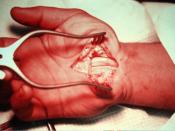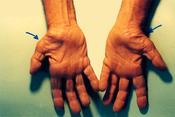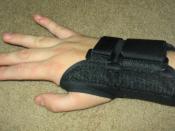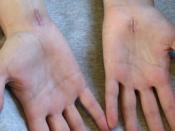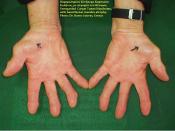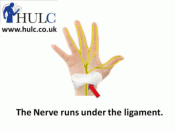What is Carpal Tunnel Syndrome? Carpal tunnel syndrome is a painful nerve problem that disrupts the use of your hand or hands. At first, you may have numbness, tingling, or burning in your hands. Shooting pain in your wrist or forearm may come after, and your grip may become weak.
Cause The cause of carpal tunnel syndrome is when the tissue or bone puts pressure on the nerve of the hand that runs from your neck through your wrist to your fingers. Other causes may include: a)Injuries, such as a blow to the wrist. This may break one or more of the carpal bone and damage the median nerve. b)Arthritis related diseases, such as rheumatoid arthritis. These diseases cause pain and swelling in the joints of the hand. They cause swelling of tissues in the hand, resulting in pressure on the median nerve. c)Work activities and hobbies, such as typing, needle working, knitting, cashier, and any hand tools or instruments that puts pressure on the base of the palm.
Symptoms Symptoms that may be involved with carpal tunnel syndrome are as follows: pain, tingling, and numbness in the thumb, index, middle, and ring fingers tingling in the entire hand pain that shoots from the hand up the arm as far as the shoulder a swollen feeling in your fingers-even though they may not be visibly swollen You may notice that: your symptoms are worse at night your hands feel weak in the morning you drop objects more than usual you have trouble grasping or pinching objects you may have trouble using your hands for certain tasks, such as buttoning a shirt, writing with a pen, or opening a jar lid Who gets it? Carpal tunnel syndrome can occur at any age. Carpal tunnel syndrome from non-work causes usually affects people in their fifties, while from work causes is highest between the ages of twenty and forty. The condition is more common in women than in men.
Treatment for Carpal tunnel syndrome After the doctor is positive that you have carpal tunnel syndrome, he or she might suggest that you wear a splint or receive an injection of anti-inflammatory medicines such as cortisone. You might try this for a month or so, but if the injection or the splint doesn't work then you might need surgery. The doctor might even give you a regime of exercises to do three or four times a day. But don't try the exercise if there is pain. You also could go to a chiropractor for exercise to help strengthen your wrist. If these treatments do not improve the condition then the doctor will recommend surgery as the last resort.
BIBLIOGRAPHY 1. Carpal Tunnel Syndrome www.aginet.com/collins.carpal html 2. Carpal Tunnel Syndrome www.orthop.washington.edu/bone and joint sources/czzzzzzz 1- 2.html
